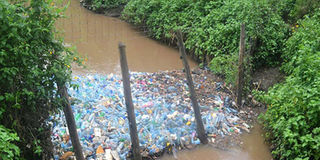Nakuru grapples with garbage menace, old dumpsites

One of the polluted rivers pours its waste into Lake Nakuru. Nakuru County government is still grappling with a rising challenge of waste management in its key towns, seven years since the advent of devolution. PHOTO | FILE | NATION MEDIA GROUP
What you need to know:
- The dumpsite poses an environmental nightmare and health hazard to residents in the populous town.
- It was to be relocated from the area but Governor Lee Kinyanjui’s administration appears to have shelved the plans.
- Naivasha, Gilgil and Molo towns are also grappling with ageing dumpsites.
Nakuru County government is still grappling with a rising challenge of waste management in its key towns, seven years since the advent of devolution.
Despite the increase in tonnage of garbage collected in its key towns including Nakuru, Molo, Naivasha and Gilgil, the county is still reeling under the problem of solid waste disposal.
In Nakuru town for instance, which is seeking a city status, the county government is struggling to manage its more than 30-year-old Gioto dumpsite located about three kilometers from Nakuru’s central business district.
HEALTH HAZARD
The dumpsite has for long been an eyesore and poses an environmental nightmare and health hazard to residents in the populous town.
It has also been blamed for the high levels of pollution in Lake Nakuru, posing an environmental hazard to the world famous Lake Nakuru National Park.
When it rains, waste laced with dangerous poisons from the dumpsite, located on the upper side of Nakuru town, is normally washed into the lake.
RELOCATION
The dumpsite was to be relocated from the area but Governor Lee Kinyanjui’s administration appears to have shelved the plans, instead opting to rehabilitate it.
The relocation plans were mooted by former governor Kinuthia Mbugua’s regime.
But the county government early this year embarked on the rehabilitation of the 30-acre dumpsite and an earth embankment and buffer greenery foliage was put up to prevent spillage of garbage into the Nakuru-Kabarak road during the rainy seasons.
The Environment department has also demarcated the dumpsite into portions where recyclable and bio-degradable garbage is dumped separately.
However, environmentalists have demanded that the county government relocates the dumpsite instead of rehabilitating it, arguing that it still poses a health hazard to residents and the Lake Nakuru National Park.
LAKE NAKURU
“We demand the relocation of Gioto dumpsite because it remains a health hazard and endangers life in Lake Nakuru. Despite the rehabilitation, when it rains dangerous and poisons and metals are washed into the lake and also to Njoro River,” Mr James Wakibia, an environmental activist told the Nation.
Members of the civil society led by the Peoples’ Power Watch group and Nakuru Town Residents Association have also piled pressure on the county government to relocate the dumpsite.
“The county government should look for an alternative waste disposal site to replace Gioto dumpsite, which has become a threat to the environment,” said Mr Jesse Karanja, the chairman of People’s Power Watch.
The dumpsite has been in use since 1974 and the previous regimes including the defunct municipal council grappled with the challenge of acquiring suitable land for its relocation.
WASTE MANAGEMENT
However, in its 2018-2022 integrated development plan, Nakuru County indicates that, as part of its transformative projects, it plans to use at least Sh300 million to enhance solid waste disposal systems in Gioto, Maai Mahiu and Naivasha.
In 2016, the National Environment Management Authority said the dumpsite did not meet the required minimum standards and that it was not at a suitable place as it is situated on the upper side of Nakuru town, making it a health hazard as most wastes are washed down into the residential areas.
Efforts to woo investors to venture into recycling of waste in the area by Mr Mbugua’s regime, including turning the site into a mini-power generation plant did not yield fruit.
INVESTORS
A number of investors, both local and international, have in the past approached the county government seeking to converte the waste into a profitable venture but most of them eventually go quiet.
Naivasha, Gilgil and Molo towns are also grappling with ageing dumpsites, weighed down by ever growing population, which has strained the existing waste management resources.
Efforts to reach the Nakuru Environment department for comment on the matter were unsuccessful as text messages and calls directed to the Water and Environment CEC Festus Ng’eno and Chief Officer Kiogora Muriithi went unanswered.
A county official who sought anonymity as he is not allowed to speak to the media said the county government in collaboration with donors is pursuing ways of recycling waste at Gioto dumpsite with long-term plans to have it relocated.





